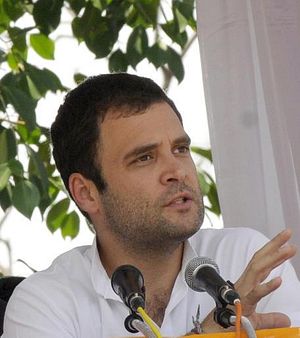Rahul Gandhi, vice president of the ruling Indian National Congress (INC) and scion of India’s famous Nehru-Gandhi political dynasty, offered the clearest signal yet that he would run for prime minister in India’s upcoming elections.
In an interview with the Indian newspaper Dainik Bhaskar, Gandhi, when asked if he would “accept the responsibilities” of a Prime Ministerial post responded that “it is necessary that Congress forms the government at the Centre; and in this direction whatever responsibilities the organisation has given me, I will discharge them with utmost sincerity and honesty.”
Gandhi’s prospects in a prime ministerial contest against the BJP’s candidate Narendra Modi are generally regarded as slim by independent analysts. Gandhi is seen as disinterested in high politics in India, and he lacks experience in any significant political office outside the Congress Party – he has never held a cabinet position or headed a state. His opponent, Modi, counts broad political experience under his belt, including overseeing Gujurat’s economic transformation. However, Modi’s candidacy is colored with controversy over his alleged involvement in the 2002 Gujurat riots that saw several hundred dead in violence that emerged along communal lines.
The Wall Street Journal writes that Gandhi generally has been averse to taking a strong line on political matters, usually deferring to Sonia Gandhi, his mother and president of the Indian National Congress for 15 years. Gandhi’s interview with Dainik Bhaskar is unique in that he speaks out on the Congress Party’s governance record during its 10 year rule.
In defending the Congress, Gandhi notes:
In the last ten years we have taken landmark decisions including MGNREGA, Right to Education Bill and Land Acquisition Bill. The Congress is committed to empowering people with more rights and opportunities. We gave the Right to Information, Right to Food, Right to Forest and Right to Identity – Aadhar etc. The UPA government will be known as a government that empowered the people of this country.
Additionally, in a bid to transform his image from that of an disinterested, apolitical heir to an active candidate for prime minister, Gandhi recanted his famous declaration that “power is poison” – something several analysts took to mean that he was disinterested in pursuing the highest office in India. Overall, Gandhi was careful to pitch himself as a vessel for the senior Congress leadership, stating that he would “obey whatever order is given to [him]” and “do whatever Congress wants [him] to do.”
The INC has yet to formally declare a political candidate, but it could determine a candidate on January 17, 2013 (a few analysts believe that it could be someone other than Rahul Gandhi).
It remains to be seen if Rahul Gandhi’s effort to reinvent himself as a vote-winning Congress Party poster boy will be successful. His critics, including the BJP, paint him as the product of immense political privilege – his opponent describes him as a “Prince.” Opinion polls continue to put the BJP ahead of Congress for the general elections, and the assembly elections in late 2013 demonstrated that a strong wave of anti-incumbency sentiment seems to have taken over the Indian electorate.
The Congress Party’s problems, however, run deeper than Rahul Gandhi. The aforementioned anti-incumbency effect is the product of Congress’ failure to deliver on broad populist schemes and its serious corruption problem. Additionally, the strong downward turn in India’s economy since 2012 is attributed to poor leadership by the incumbent UPA government. Rahul Gandhi may be a poor face to lead the charge as Congress heads into what is sure to be an uphill struggle for parliamentary seats in the general election, but short of a complete reinvention, the INC can do little to ameliorate its political fortunes.

































